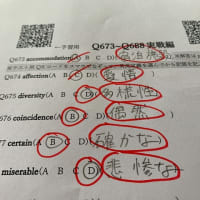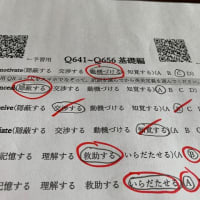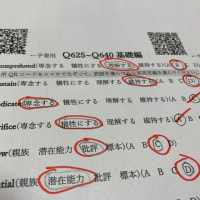著作権の切れた童話「ドリトル先生アフリカゆき」から、シンプルで、大学入試にもTOEICにも英検にも有効な練習問題を作成しています。楽しみながら英語力を伸ばしていただければ幸いです。
他言語習得には時間と手間がかかります。中高六年間の英語学習成果としては英語圏の小学生レベルの英文が読めて英英辞典が使える程度に達していれば十分でしょう。日本人英語学習者が伸び悩む大きな要因は基礎を固めずに応用に走ることにあります。
(2)
"Oh, no," said the Doctor quickly. "You mustn't do that. That wouldn't be right."
"Oh, I didn't mean real sick," answered the Cat's-meat-Man. "Just a little something to make them droopy-like was what I had reference to. But as you say, maybe it ain't quite ①( )air on the animals. But they'll get sick anyway, because the old women always give 'em too much to eat. And look, all the farmers 'round about who had lame horses and weak lambs—they'd come. Be an animal-doctor."
When the Cat's-meat-Man had gone the parrot flew off the window on to the Doctor's table and said,
"That man's got ②( )ense. That's what you ought to do. Be an animal-doctor. Give the ③( )illy people up—if they haven't brains enough to see you're the best doctor in the world. Take care of animals ④( )( )stead—THEY'll soon find it out. Be an animal-doctor."
"Oh, there are plenty of animal-doctors," said John Dolittle, putting the flower-pots outside on the window-sill to get the rain.
"Yes, there ARE plenty," said Polynesia. "But none of them are any good at all. Now listen, Doctor, and I'll tell you something. Did you know that animals can talk?"
"I knew that parrots can talk," said the Doctor.
"Oh, we ⑤(in / parrots / talk / can ) two languages—people's language and bird-language," said Polynesia proudly. "If I say, 'Polly wants a cracker,' you understand me. But hear this: Ka-ka oi-ee, fee-fee?"
"Good Gracious!" cried the Doctor. "What does that mean?"
"That means, 'Is the porridge hot yet?'—in bird-language."
"My! You don't say so!" said the Doctor. "You never talked that way to me before."
"What would have been the good?" said Polynesia, dusting some cracker-crumbs off her left wing. "You wouldn't ⑥(understood / have / if / me ) I had."
"Tell me some more," said the Doctor, all ⑦( )xcited; and he ⑧( )ushed over to the dresser-drawer and came back with the butcher's book and a pencil. "Now don't go too fast—and I'll write it down. This is interesting—very interesting—something quite new. Give me the Birds' A.B.C. first—slowly now."
So that was the way the Doctor came to know that animals had a ⑨(own / their / of / language ) and could talk to one another. And all that afternoon, while it was raining, Polynesia sat on the kitchen table giving him bird words ⑩(put / to / in / down) the book.
At tea-time, when the dog, Jip, came in, the parrot said to the Doctor, "See, HE'S talking to you."
"Looks to me as though he were ⑪( )cratching his ear," said the Doctor.
"But animals don't always speak with their mouths," said the parrot in a high voice, ⑫( )aising her eyebrows. "They talk with their ears, with their feet, with their tails—with everything. Sometimes they don't WANT to make a ⑬( )oise. Do you see now the way he's twitching up one side of his nose?"
"What's that mean?" asked the Doctor.
"That means, 'Can't ⑭(that / you / it / see ) has stopped raining?'" Polynesia answered. "He is asking you a question. Dogs nearly always use their noses for asking questions."
After a while, with the parrot's help, the Doctor got to learn the language of the animals so well that he could talk to them himself and understand everything they said. Then he gave up being a people's doctor altogether.
As soon as the Cat's-meat-Man had told every one that John Dolittle was going to become an animal-doctor, old ladies began to bring him their pet pugs and poodles who had eaten too much cake; and farmers came many miles to show him sick cows and sheep.
One day a plow-horse was brought to him; and the poor thing was ⑮( )( )rribly glad to find a man who could talk in horse-language.
"You know, Doctor," said the horse, "that vet over the hill knows nothing at all. He has been ⑯( )reating me six weeks now—for spavins. What I need is SPECTACLES. I am going blind in one eye. There's no reason why horses shouldn't wear glasses, the same as people. But that stupid man over the hill never even looked at my eyes. He kept on giving me big pills. I tried to tell him; but he couldn't understand a word of horse-language. What ⑰(need / I / spectacles / is )."
"Of course—of course," said the Doctor. "I'll get you some at once."
"I would like a pair like yours," said the horse—"only green. They'll keep the sun out of my eyes while I'm plowing the Fifty-Acre Field."
"Certainly," said the Doctor. "Green ones you shall have."
"You know, the ⑱( )( )ouble is, Sir," said the plow-horse as the Doctor opened the front door to let him out—"the trouble is that ANYBODY thinks he can doctor animals—just because the animals don't ⑲( )omplain. As a matter of fact it takes a much cleverer man to be a really good animal-doctor than it does to be a good people's doctor. My farmer's boy thinks he knows all about horses. I wish you could see him—his face is so fat he ⑳(he / looks / though / as) had no eyes—and he has got as much brain as a potato-bug. He tried to put a mustard-plaster on me last week."
※(2)の解答①fair②sense③silly ④instead⑤(parrots can talk in) ⑥(have understood me if )⑦excited⑧rushed⑨(language of their own)⑩(to put down in)⑪scratching⑫raising⑬noise⑭(you see that it)⑮terribly⑯treating⑰(I need is spectacles)⑱trouble⑲complain ⑳(looks as though he)
他言語習得には時間と手間がかかります。中高六年間の英語学習成果としては英語圏の小学生レベルの英文が読めて英英辞典が使える程度に達していれば十分でしょう。日本人英語学習者が伸び悩む大きな要因は基礎を固めずに応用に走ることにあります。
(2)
"Oh, no," said the Doctor quickly. "You mustn't do that. That wouldn't be right."
"Oh, I didn't mean real sick," answered the Cat's-meat-Man. "Just a little something to make them droopy-like was what I had reference to. But as you say, maybe it ain't quite ①( )air on the animals. But they'll get sick anyway, because the old women always give 'em too much to eat. And look, all the farmers 'round about who had lame horses and weak lambs—they'd come. Be an animal-doctor."
When the Cat's-meat-Man had gone the parrot flew off the window on to the Doctor's table and said,
"That man's got ②( )ense. That's what you ought to do. Be an animal-doctor. Give the ③( )illy people up—if they haven't brains enough to see you're the best doctor in the world. Take care of animals ④( )( )stead—THEY'll soon find it out. Be an animal-doctor."
"Oh, there are plenty of animal-doctors," said John Dolittle, putting the flower-pots outside on the window-sill to get the rain.
"Yes, there ARE plenty," said Polynesia. "But none of them are any good at all. Now listen, Doctor, and I'll tell you something. Did you know that animals can talk?"
"I knew that parrots can talk," said the Doctor.
"Oh, we ⑤(in / parrots / talk / can ) two languages—people's language and bird-language," said Polynesia proudly. "If I say, 'Polly wants a cracker,' you understand me. But hear this: Ka-ka oi-ee, fee-fee?"
"Good Gracious!" cried the Doctor. "What does that mean?"
"That means, 'Is the porridge hot yet?'—in bird-language."
"My! You don't say so!" said the Doctor. "You never talked that way to me before."
"What would have been the good?" said Polynesia, dusting some cracker-crumbs off her left wing. "You wouldn't ⑥(understood / have / if / me ) I had."
"Tell me some more," said the Doctor, all ⑦( )xcited; and he ⑧( )ushed over to the dresser-drawer and came back with the butcher's book and a pencil. "Now don't go too fast—and I'll write it down. This is interesting—very interesting—something quite new. Give me the Birds' A.B.C. first—slowly now."
So that was the way the Doctor came to know that animals had a ⑨(own / their / of / language ) and could talk to one another. And all that afternoon, while it was raining, Polynesia sat on the kitchen table giving him bird words ⑩(put / to / in / down) the book.
At tea-time, when the dog, Jip, came in, the parrot said to the Doctor, "See, HE'S talking to you."
"Looks to me as though he were ⑪( )cratching his ear," said the Doctor.
"But animals don't always speak with their mouths," said the parrot in a high voice, ⑫( )aising her eyebrows. "They talk with their ears, with their feet, with their tails—with everything. Sometimes they don't WANT to make a ⑬( )oise. Do you see now the way he's twitching up one side of his nose?"
"What's that mean?" asked the Doctor.
"That means, 'Can't ⑭(that / you / it / see ) has stopped raining?'" Polynesia answered. "He is asking you a question. Dogs nearly always use their noses for asking questions."
After a while, with the parrot's help, the Doctor got to learn the language of the animals so well that he could talk to them himself and understand everything they said. Then he gave up being a people's doctor altogether.
As soon as the Cat's-meat-Man had told every one that John Dolittle was going to become an animal-doctor, old ladies began to bring him their pet pugs and poodles who had eaten too much cake; and farmers came many miles to show him sick cows and sheep.
One day a plow-horse was brought to him; and the poor thing was ⑮( )( )rribly glad to find a man who could talk in horse-language.
"You know, Doctor," said the horse, "that vet over the hill knows nothing at all. He has been ⑯( )reating me six weeks now—for spavins. What I need is SPECTACLES. I am going blind in one eye. There's no reason why horses shouldn't wear glasses, the same as people. But that stupid man over the hill never even looked at my eyes. He kept on giving me big pills. I tried to tell him; but he couldn't understand a word of horse-language. What ⑰(need / I / spectacles / is )."
"Of course—of course," said the Doctor. "I'll get you some at once."
"I would like a pair like yours," said the horse—"only green. They'll keep the sun out of my eyes while I'm plowing the Fifty-Acre Field."
"Certainly," said the Doctor. "Green ones you shall have."
"You know, the ⑱( )( )ouble is, Sir," said the plow-horse as the Doctor opened the front door to let him out—"the trouble is that ANYBODY thinks he can doctor animals—just because the animals don't ⑲( )omplain. As a matter of fact it takes a much cleverer man to be a really good animal-doctor than it does to be a good people's doctor. My farmer's boy thinks he knows all about horses. I wish you could see him—his face is so fat he ⑳(he / looks / though / as) had no eyes—and he has got as much brain as a potato-bug. He tried to put a mustard-plaster on me last week."
※(2)の解答①fair②sense③silly ④instead⑤(parrots can talk in) ⑥(have understood me if )⑦excited⑧rushed⑨(language of their own)⑩(to put down in)⑪scratching⑫raising⑬noise⑭(you see that it)⑮terribly⑯treating⑰(I need is spectacles)⑱trouble⑲complain ⑳(looks as though he)






















※コメント投稿者のブログIDはブログ作成者のみに通知されます